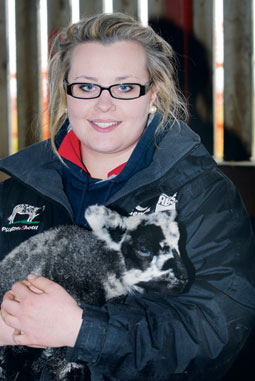Tips for youngsters considering a career in agriculture

Leaving school can be a daunting prospect.
There’s much to be optimistic about, however, if you’re considering a future in the land sector as it’s encouragingly buoyant compared to many in the current economic climate.
It also has room for a wide range of skills so, regardless of the route you choose – whether you head out into the world of work or opt to do further study – it’s a excellent career choice.
But it’s always good to have a plan, so here are a few key things to consider, whatever stage of education you’re at:
Get your foundations right
This means your GCSEs. It’s tempting to think that school doesn’t matter, that a vocationally dominated profession such as agriculture needs hands-on skills and nothing more, but you’d be wrong. You need your maths, and you need your English (Language) GCSE grades to be C ideally.
Why? First, you need to be literate enough to apply for jobs otherwise you’ll fall at the very first hurdle, and when you’re in them, to deal with paperwork and other issues.
Second, you need to be numerate enough to look after your own finances and life, let alone that of the business you may be working for. If you struggle with either of these, be honest with yourself and get help – every school or college worth its salt will be able to provide additional support and opportunities for you to improve your basic skills.
Finally, these are “gateway” qualifications. Without them, it’s much harder to progress on to the next stage and therefore you’re going to find your options a bit more limited. Everything you should be doing is about options – give yourself as many as possible, and if that means knuckling down for a bit and easing up on other activities such as Young Farmers for a couple of months, then that’s the grown-up thing to do.
Decide what “land-based” means to you
This isn’t as easy as it sounds. For example – if you’re from traditional farming stock and have always wanted to follow on in the family dairy business, it makes sense to choose a general course in agriculture that will give you a good grounding in the wide range of skills you will need to have to run and support a business effectively, such as the National Diploma in Agriculture (NDA).
Be aware, though, many qualification names will be changing over the next 12 months due to new national guidelines – get advice from your chosen colleges or Connexions advisers if you’re unsure about what’s the right level for you.
Perhaps you are more interested in the mechanical aspects of agriculture, in which case you need to consider a more specialised route. At Hartpury, for example, we offer National Diploma routes in both Farm Mechanisation and Land-Based Technology. The latter is a more scientific and diagnostic route, the former more hands-on and practical. What suits your ambitions and abilities? Only you can decide.
Today’s farmers and farm managers are also accountants, business managers, marketing experts, environmental scientists and personnel managers. Often all in an afternoon.
Add to this the planning of diversification, dealing with paperwork and the practicalities of broken fences and machinery, it’s clear you’ll need a wide range of skills before you’re able to make the grade. Again this brings us back to the key point of the education process giving you options.
Get practical experience
The final part of the jigsaw (for now) is ensuring you’re going to get a decent range of practical and relevant work-related experience.
Again, the college courses you opt for are going to help – but do they give you work experience? How many of them (for example) include the traditional full year-out in agriculture in the NDA. It may sound old-fashioned, but it’ll make you a great deal more employable at the end.
Do they give you a range of other certificates and qualifications along the way, such as Loadall, Pesticide Application, First Aid, Health and Safety, Transportation of Livestock etc?
Are there other things you could be doing right now, or in the near future, to give yourself the best chance of getting the job interview when you finally break out from home? You may think you know all there is to know about dairy, but if a farm manger role comes up on a mixed farm, it would be helpful to at least have some idea of how the arable world operates.
Hopefully these pointers should help set you thinking in the right direction for life beyond school and encourage you to set yourself up correctly for work in the sector.
There are very few roles as vocational as those based in the rural communities of the UK, and given the average age of farmers now approaches 60, there is a desperate need for young people to make the most of their talent and develop their skills to make a significant contribution to the future of British farming.
The future of the industry needs highly skilled, able young people to drive the business forward and, if you’re willing to take that challenge on, there can be few more satisfying and rewarding prospects out there.
CASE STUDY: Sarah Pugh, National Diploma in Agriculture at Hartpury College
 Sarah is hoping to join her father, a third-generation farmer, on his dairy farm in Kempley once she finishes her studies.
Sarah is hoping to join her father, a third-generation farmer, on his dairy farm in Kempley once she finishes her studies.
Sarah, 17, often helps out on the 220-cow dairy unit while juggling other responsibilities including studies, duties on the college farm, looking after her horse, dogs and chickens, as well as working on a neighbouring farm as a relief milker. Sarah is also involved with her local Young Farmers group and she likes to ride or go hunting.
Originally Sarah had considered a specific dairy-related course. However her father suggested that she would be better placed if she gained a much broader understanding of agriculture.
When Sarah finishes her National Diploma, she plans to go to university to study agriculture and in the future she would like to work on the family farm or seek a career within the dairy industry.
Sarah also hopes to travel to Canada or the USA to look at other dairy farms and experience farming on a much larger scale.
Aside from dairy farming, Sarah would like to learn more about sheep and chicken farming.
“I’m really interested in sheep farming, and have enjoyed sheep duties this year as the second flock have started to lamb and, while I’ve been brought up on a dairy farm, it would be good to gain knowledge of different livestock, should there be a need to diversify the farm at a later date,” she says.
“I really enjoy the practical nature of my course where we undertake farm duties on a rota basis which could be anything from milking at 5.30am, to completing yard duties, feeding the livestock, mending fences or gates or maintaining hedges as part of estate maintenance or helping out with lambing. I spent my Easter holiday on a sheep farm in Wales helping with lambing which was a great experience.”
Sarah is also gaining practical qualifications and has taken courses in health and safety, as well as gaining her rough terrain telescopic handler certificate of competence.
Sarah already has her tractor licence and has recently passed her driving test and suggests getting a driving licence is important for anyone who wants to work in farming.
About Malcolm
Malcolm was appointed as Principal of Hartpury College in May 1990 when there were only 60 students on two full-time agricultural courses. It is now home to over 3300 full-time students all with a keen interest in Animal, Equine, Land or Sports Sciences with an annual turnover of £25m.
